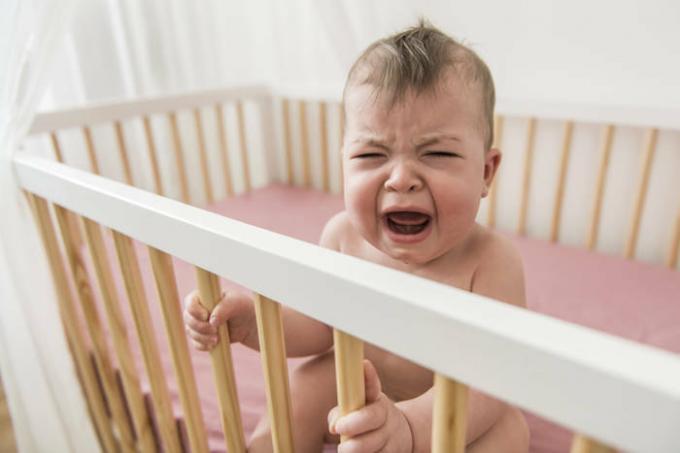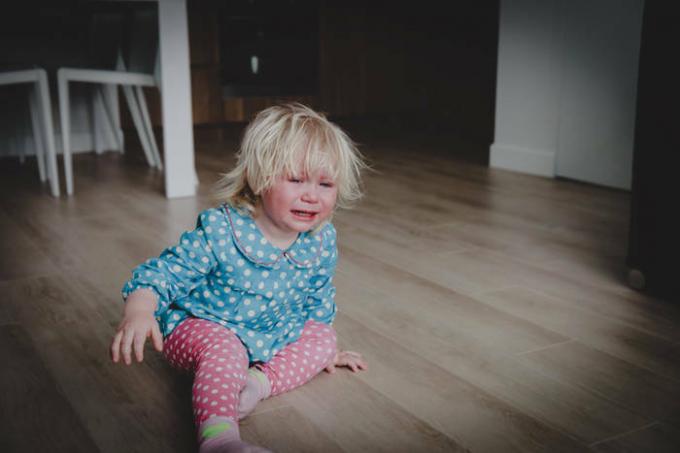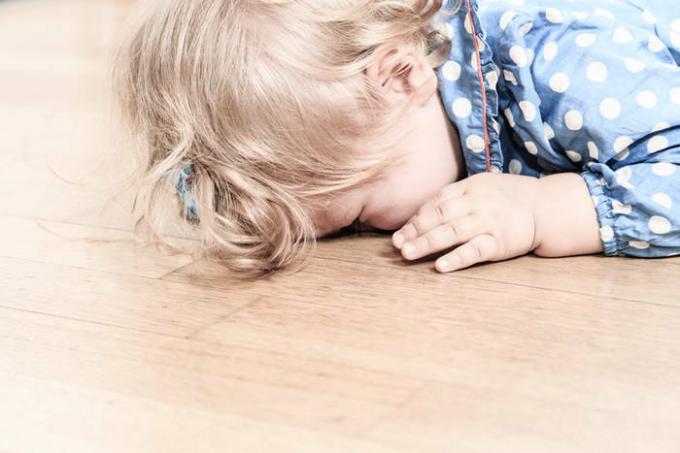What to do if the child starts banging his head against the wall or hitting himself. The reasons for this behavior and markers when you need to go to a specialist.
In the evenings or on the eve of naps, your little one begins to behave strangely against the background of general well-being. He shakes his head in different directions, or for 10-15 minutes rhythmically beats his head against the wall, side of the bed or mattress. Often these movements frighten parents very much, and they begin to suspect the child has neuropsychiatric disorders. In fact, several such episodes of behavior are not yet a sign of problems in the development of the baby. Together with a pediatric neurologist Alexander Miroshnikov we figured out why a child can bang his head, what parents need to do in this case and when to go to a specialist.
The reasons why a child bangs his head against hard objects can be different. Ranging from the most harmless (for example, attention deficit or the way parents are manipulated), and ending with quite serious (autism spectrum disorders). If you notice this behavior in a baby, do not rush to immediately go to extremes or make diagnoses. There is no need to prohibit, let alone punish a child for this. Or after the first episode, immediately lead him into a raid on all the specialists of your city. First, exhale and watch your baby calmly for several days. Perhaps you just need to adjust your daily routine or slightly change your behavior.
Reason one: an alternative to motion sickness

Babies bump their heads when they can't sleep / istockphoto.com
“For some children aged 6 months to 3 years, this is a completely normal behavior before going to bed,” says Alexander Miroshnikov. - They bang their heads on nearby surfaces to calm down. Rhythmic beats in this case work like motion sickness, helping the baby fall asleep faster. It does not last long, up to 15 minutes in total. In this case, the blows are not strong: most often the child beats his forehead against the mattress, lying face down, or lightly hits the sides of the bed. "
In medicine, this is called mystical movement disorder during sleep. This behavior occurs in about 10% of children. Moreover, according to the observations of experts, boys are three times more likely than girls. If you notice such a habit for your baby, and at the same time clearly trace that he beats his head only before bedtime, there is no reason for concern. The child will not injure himself (the instinct of self-preservation is triggered here), and the habit itself will gradually go away with the maturation of certain parts of the brain. You need to see a doctor only if the habit has taken hold and persists in the baby after reaching the age of three.
Reason two: lack of attention

Sometimes a child hits himself to get attention / istockphoto.com
If your child starts banging his forehead or the back of his head against a wall, wardrobe, bed or nightstand while playing, he may want to trigger you to some kind of reaction in this way. You should not rush to the child overnight with hugs and universal anxiety in your eyes. Watch your baby. If, when performing these actions, he is "included" in the world around him and, as if on the sly, is watching you, it means that he is simply testing different ways of attracting attention.
If the mother reacts sharply to episodes of such behavior every time, the child will understand that the method works, and the habit can be fixed. Therefore, try to pay as little attention to it as possible. At the same time, try to improve the quality of your time with your baby. Perhaps he just lacks interest and participation on your part.
Reason three: manipulative behavior

Children often bang their heads to get what they want / istockphoto.com
Sometimes the head-banging habit is developed as a child's response to parental prohibitions. This action is observed in children after a year and is clearly manipulative. In this case, the baby specifically scares the parents, who often give up and make the desired concessions. The child may also try to avoid punishment for a misdemeanor by hitting the head with the head. For example, I painted the wallpaper in the room and is now afraid of parental reaction. The logic in this case is simple: my mother will pity me and will not scold me for what I have done.
If you notice such attempts to manipulate your baby, in the first place, you do not need to punish the child. Watch yourself. Perhaps you are too soft or, on the contrary, too hard a parent. In the first case, do not go to provocations and restrain your desire to yield to the child's demands. A small manipulator will not persecute himself with tangible harm, but for the third or fifth time he will understand that this method does not help to achieve what he wants. In the second case, think - maybe you are punishing the kid too much for wrongdoing, and you should lower the "degree" of severity so that he is not afraid of your reactions.
Reason four: severe disorder

Autoaggression is one of the reasons to visit a pediatric neurologist / istockphoto.com
Often, children start banging their heads or hitting themselves in the face, crown, or body due to overwhelming negative emotions. It was not possible to assemble the puzzle, the drawing did not come out, I could not defend the toy on the playground, I did not wait for my turn on the swing. Any situation that causes nervous tension in the baby can become a reason for auto-aggression. In this case, the child seems to be trying to shift the focus of attention and "block" psychological stress with physical pain.
Isolated cases of such behavior indicate that the baby does not know how to show his emotions in other ways. You should pay extra attention to this and work with it all possible reactions to strong experiences. You can share your pain with your parents, just cry or stomp your feet. It also happens that autoaggression manifests itself in very young children, who find it difficult to explain and show other ways of releasing negative emotions. In this case, try to calm your baby by switching his attention. If you notice the manifestations of autoaggression in a child, they happen quite often and cannot be corrected “at home” - this is a reason to appear to a pediatric neurologist.
Reason five: neurological problems

Frequent episodes of banging the head indicate nervous problems / istockphoto.com
It also happens that regular episodes of head banging indicate some deviations in the development of the baby's nervous system. “Pay special attention if head strikes start suddenly and are accompanied by severe hysteria and aggression,” emphasizes Alexander Miroshnikov. - It is also worth worrying if, in addition to banging your head, you notice other symptoms: delayed speech development, lack of eye contact, problems with social communication. In this case, it is imperative to see a specialist in order to exclude ASD (Autism Spectrum Disorders). "
Before visiting the doctor, try to protect your child from injury as much as possible and eliminate possible reasons for this behavior. According to Alexander Miroshnikov, the most common reasons for head blows in children with ASD may be as follows:
- anxiety and discomfort, attempts to show that the situation is unpleasant for the child
- protesting or getting attention
- fatigue, lack of sleep
- deficiency of vitamins or minerals
- sensory impairment (overabundance or deficiency of sensory stimulation)
- any kind of pain (migraine, abdominal pain, otitis media, sinusitis, toothache, constipation)
- hormonal disorders
- deficiency of GABA (gamma-aminomalic acid) in the body
You will also be interested in reading:
How a child who lacks attention behaves: the psychologist answers
5 types of baby tantrums that drive even staunch parents crazy
If the child is a "guest performer": how to cope with a child's tantrum?

